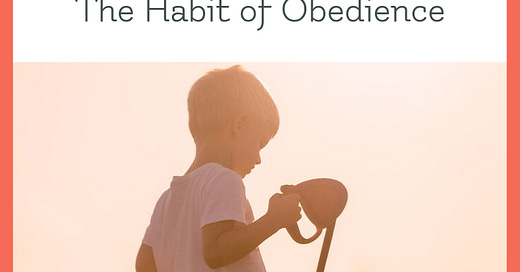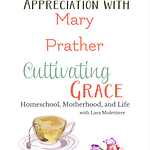Charlotte Mason and the Habit of Obedience
Whether you're a Charlotte Mason veteran, exploring Charlotte Mason early years, or transitioning to a Charlotte Mason homeschool, this article is for you. Grab a cup of tea and pull up a chair as we're going over Charlotte Mason Principle 3, the habit of obedience!
Did you know there are a total of 20 Charlotte Mason Principles many homeschool moms adhere to? Would you like a practical guide to help you understand some of her wisdom and knowledge? You've come to the right place, my friends. Here's a snapshot of all 20 Charlotte Mason Principles with a brief overview.
For those who are ready, let's saturate ourselves with teaching authority and obedience. If you missed the first two principles, check out Principle 1: Children are Born Persons and Principle 2: A Child's Good & Evil Nature.
Principle 3: Authority and Obedience
The principles of authority on the one hand, and of obedience on the other, are natural, necessary and fundamental
Whether you have a natural-born leader or a child who tends to shadow others, all children must learn self-control - the mastering of their own will - to do the right. An essential part of habit training must include learning to obey those in authority. The very first of which are parents.
Mrs. Dowson's paper on Authority, as recorded in The Parents' Review, volume 11, 1900, pgs 423-436, stated it this way:
"Honour thy father and thy mother, that thy days may be long in the land the Lord thy God giveth thee." Practical reverence for authority, little as some of us have been willing to admit it, is the condition of life in the 'land' given us, the land where we may grow and strengthen, and win the good that is, indeed, freely provided for us, but is to be won only on condition that we share it with the rest. 'Father' and 'Mother' are the typical representatives of authority and the first presenters of it. They bring to the child the first touch of the social consciousness; they embody it for him; they are, for him, the pillar and ground of all good, and he rests on them and looks to them; his 'imitation' follows them, and, with what they supply, his 'invention' deals. Beyond father and mother, there opens out for him, bit by bit, a view of other authorities, other representatives of the mind of the developing Greater Man; but he will see that the justice of its claim upon him is rooted where that of his father and mother is rooted, and that the reasonableness of its claim is the reasonableness of theirs."
Let's face it -- there is always someone else in authority throughout each stage of life whether you're a child, teenager, or adult. Here are some examples: a husband answers to God, a wife submits to her husband, and a child obeys their parents.
Regardless of your child's environment -- whether it's at home with family or within a community, one must submit to some type of authority. It could be a teacher in Sunday School, an Awana's program, or at a co-op. Maybe you and your husband scheduled a date and need a babysitter -- is your child ready to listen to a younger person in authority? If your child struggles in this area, do not worry, there is hope, help, and grace in abundance!
What Does Charlotte Mason Say About Habits of Obedience
Charlotte Mason states, "First and infinitely the most important, is the habit of obedience. " She continues to discuss this critical habit with, "every other duty of the child is fulfilled as a matter of obedience to his parents." So, as you can see, it's actually the foundational habit training requirement according to Miss Mason.
And, here's a gentle reminder that hits all of us parents hard. Charlotte reminds us, "every act of disobedience in the child is a direct condemnation of the parent." In other words, if a child is purposely disobedient, it's a direct violation to us as parents. Our child is essentially saying, "I do not agree with your authority and will not listen to you!"
Children must have the Desire to Obey.––It is only in proportion as the will of the child is in the act of obedience, and he obeys because his sense of right makes him desire to obey in spite of temptations to disobedience––not of constraint, but willingly––that the habit has been formed which will, hereafter, enable the child to use the strength of his will against his inclinations when these prompt him to lawless courses. It is said that the children of parents who are most strict in exacting obedience often turn out ill; and that orphans and other poor waifs brought up under strict discipline only wait their opportunity to break into license. Exactly so; because, in these cases, there is no gradual training of the child in the habit of obedience; no gradual enlisting of his will on the side of sweet service and a free will offering of submission to the highest law: the poor children are simply bullied into submission to the will, that is, the wilfulness, of another; not at all, 'for it is right'; only because it is convenient. - Charlotte Mason, Volume 1
How To Begin Charlotte Mason Habit Training: Obedience
Now, you may be wondering -- how do I instill these good habits? Honestly, it takes perseverance, consistency, and most of all, the courage to make it happen by continuing with diligence the gentle daily guiding of our children. But, the Lord says if we train a child in the way they should go, they will not depart from it!
Before we begin, let's lay down the rails. There is no room for child-led discipline -- you are the parent and authority in charge. But, that doesn't mean your title turns your home into a dictatorship. Instead, you are the shepherd of your children and will lead them into the best habits in a kind and gentle way.
To truly command the obedience of our children, we must first have their hearts. That is how we enlist their will into sweet service. Sally Clarkson shares this wisdom:
"Proverbs also tells us, "Train up a child in the way he should go, and when he is old he will not depart from it. It is a process--a little here, a little there, a little again. Giving our children the appetite for obedience, wisdom, love, and holiness.
I am so grateful in my own life, that God did not overwhelm me with all of my sin and selfishness at once. I would have quit if He had treated me harshly. I wanted to please God and I wanted to be righteous, but didn't even know that I was so very immature. My heart was right in my own eyes and was seeking to please Him, but my character and behavior lacked so much. it has taken me a life-time to understand just what it really means to be sacrificially loving, loyal in my faith, righteous and generous in my behavior. If God has treated me in such a way, shouldn't that be the way I treat my children."
Here are 4 key habit training practices for consistent results:
Consistency - If you give a command and consequence, stick with it. Write every command with their consequence down if you have a tendency to forget. Tack it on the fridge in a positive nature. For example, "All vegetables will be eaten to strengthen our bodies before getting down from the table." The reward is nurturing our bodies and consequence is staying at the table indefinitely.
Consequences - Whether natural or intentional, every command should have a consequence. And, it should be reasonable for their age and ability level.
Praise - Reward your child with praise when you see them doing something nice or making a good choice. Praise goes a LONG way. Remember to praise their choice, not their ego. Instead of "I'm so proud of you for XYZ", try "I'm so pleased to see how diligently you've been practicing XYZ. You're becoming very accomplished" or "I'm so pleased to see how your heart is growing wise - that was a difficult choice".
Practice - It will take several times before your children obey immediately -- continuously training them to develop excellent lifelong habits is a marathon, not a sprint. Especially for the younger years, make sure you choose times when you're at home and not busy for the bulk of your habit training.















Share this post